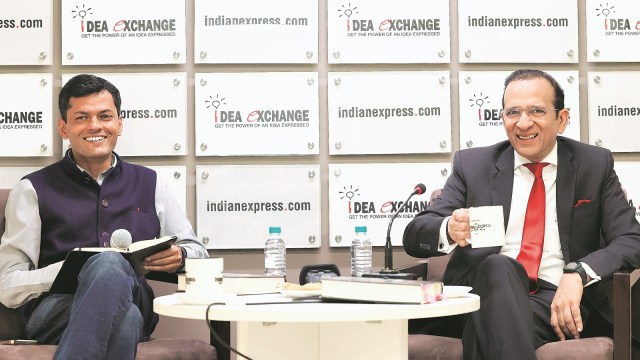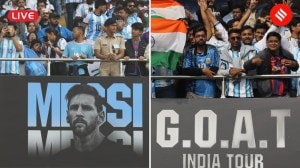Ex-envoy Ajay Bisaria at Idea Exchange: ‘India should engage with Pakistan to consolidate gains in curbing terrorism’
Ajay Bisaria was the High Commissioner to Pakistan from 2017 to August 2019 and was expelled after the abrogation of Article 370.
 Former Indian High Commissioner to Pakistan Ajay Bisaria at the Noida office of The Indian Express. (Express photo by Renuka Puri)
Former Indian High Commissioner to Pakistan Ajay Bisaria at the Noida office of The Indian Express. (Express photo by Renuka Puri)Shubhajit Roy: There are two revelations in the book. One concerns the1999-2004 period, when you were in the PMO and had been part of conversations with the then Prime Minister, Atal Bihari Vajpayee, and then National Security Advisor Brajesh Mishra. The second one was about your tenure as high commissioner in Islamabad, which was cut short. How different have these two regimes been in their approach to Pakistan?
Between 1999 and 2004, I was, maybe, a fly on the wall, and more recently was one of the actors. There hasn’t been a dramatic shift but an organic evolution of a policy. The dominant theme in the Vajpayee years was dealing with terrorism. In 1998 we had gone nuclear and Vajpayee was deeply conscious of that nuclear responsibility. At that time it wasn’t really clear to us what Pakistan’s red lines were. So that was a factor in the policy-making on Pakistan.
Yet terrorism was a huge challenge. 9/11, the Kandahar hijack and the December 13 attack on the Parliament had happened. That dilemma of how to deal with terrorism was what the Modi government faced as soon as it took over in 2014. Modi wanted to do exactly what Vajpayee wanted, which is to untie the knot. In his initial two years, Modi met his Pakistani counterpart Nawaz Sharif five times. And yet, the deal breaker in both cases was terrorism like it was with Kargil and the attack on Parliament. But with surgical strikes in 2016 and air strike in 2019, we had a better answer for terrorism in the sub-conventional space. In this space, the debate was about could we escalate it to conventional warfare? We have evolved with a few new inventions in dealing with terrorism.
Shubhajit Roy: Many would argue that the hardline approach may have put India in a box…
Well, I would argue that there’s a smart way out of that dilemma. Because, “no talks with terror” is ambiguous. There could be a two-track policy. On terrorism, now the benchmark is that a Pulwama gets a Balakot or a Balakot-plus kind of response from India, right? And it will be incumbent on any future government to factor this in. But that doesn’t preclude engagement. In my book, I advocate a two-track policy of being tough on terror — delegitimising and countering terrorism accompanied by a calibrated and flexible engagement. Pakistan has been incoherent in the last few years with its political crises. If we had a conversation, who would we have it with? But if it becomes more coherent with an election, possibly have a same-page government, then it is time for India to engage. It should not have a policy of strategic neglect of Pakistan but engage with it. There is a way out. It’s a combination of being tough on terror, being willing to use kinetic means of responding to terror, but at the same time, being flexible about engagement.

Shubhajit Roy: Your comments on the elections in Pakistan and the Army being in saddle.
The Army has certainly been challenged. There are multiple ways of framing this election. At one level, it was a contest between the old and the new Pakistan. The old Pakistan was run by the Army with civilians trying to curry favour with it. The new Pakistan is young, aspirational with 50 per cent of the population under the age of 30 and united under a mascot called Imran Khan. This new constituency has expressed itself in the ballot box. So the outcome was completely predictable.
With surgical strikes in 2016 and the air strike in 2019, India had a better answer for terrorism in the sub-conventional space. Our policy has evolved with a few new inventions in dealing with terrorism
Story continues below this ad
But the process was surprising because the Army goofed up enough to let it be known that the people’s will was in a completely different direction. It was kind of two-thirds, a major wave in favour of Imran Khan. The election template was the same for a long time — Civilian politicians out of favour put in jail, quietly going away, then doing a deal and coming back. The Army’s latest favourite horse was made to win with pre-election engineering, election engineering, post election engineering. Two things changed in Pakistan from 2018. One was the economic crisis arising from accumulated sins of the past, with 37 per cent inflation. The second was a political crisis that arose with the US exit of Afghanistan in 2021 and the Tehreek-e-Taliban there posing a security threat. The Army’s Project Imran became so successful that when the project was divorced from Imran, the people weren’t willing to divorce him. He was already charismatic and popular. So the two-thirds majority anti-Army wave coalesced with a strong protest vote and popular disaffection. Then there was a sympathy wave since Imran was in jail. For the Army, Imran should have disappeared. But he didn’t despite the largescale rigging.
Even Zulfiqar Bhutto had rigged elections in 1977 but there was a lot of protest and disaffection on the streets, and he declared martial law. General Zia ul-Haq took over, Bhutto was hanged and Haq took a decade to conduct elections he had promised in 90 days. In the 1970s, Sheikh Mujibur Rahman won from jail, exactly like Imran Khan, in east Pakistan and led to the creation of Bangladesh.

This scenario is what the Army fears, a breakup of the country because of the Pashtun and Baloch movements. If the Army takes over, Pakistan would lose its equity with the West, including IMF loans. So the Army could go for a hybrid government. It had one with Imran and with Shehbaz Sharif for 16 months. Going forward, it will hope that this government goes the usual Purana Pakistan route, outsourcing foreign and security policy to the Army, doing what it’s told and fixing the economy.
Shubhajit Roy: What happens to the future of Imran Khan and Pakistan Tehreek-e-Insaf (PTI) because there are still 93 candidates backed by him?
The Independents have done an alliance with a smaller party, the Sunni Ittehad Council, hoping somehow to get proportionate representation but they still don’t make the numbers. They will hope that if there’s disaffection, the Army would get Imran back in play if it wants to rotate its civilian leadership. This group is a political troublemaker in this hybrid situation.
The Army’s Project Imran became so successful that when the project was divorced from Imran, the people weren’t willing to divorce him. So the two-thirds majority anti-Army wave coalesced with a strong protest vote
Rakesh Sinha: If this Army-backed coalition in Pakistan stabilises a little, do you see India reaching out?
There is reason for cautious optimism on that front. Many objective factors favour a rapprochement. One, it is the Sharifs in control and not Imran who was too anti-India. Two, elections are being held in both countries and have been historically a reason for a fresh look at the relationship. Three, the ceasefire of 2021 has held. Four, we haven’t had spectacular acts of terrorism. The new Pakistan government will have to internally resolve its issue of not talking to India until Article 370 is reversed. That is their problem. As for sending in high commissioners, I don’t see that happening before India’s elections. There could be some positivity, but this is a time for some or quiet conversations. It is in India’s interest to pursue the gains we’ve had on the reduction in terrorism front by doing that. Particularly, it would be important for India to see that anything that comes from the civilians is triangulated with the Army.
 Former Indian High Commissioner to Pakistan Ajay Bisaria. (Express photo by Renuka Puri)
Former Indian High Commissioner to Pakistan Ajay Bisaria. (Express photo by Renuka Puri)
Shubhajit Roy: In your book, you mention about how Pakistan’s ISI passed on intelligence to India through you, which turned out to be correct. Asim Munir was the ISI chief then.
Well, the jury is out on Asim Munir (now Chief of Army Staff of Pakistan). He hasn’t put his cards on the table although a Munir doctrine was published. But institutionally, the Army sees the merit in the doctrine of its former chief Qamar Bajwa in making good with Pakistan’s neighbours and focussing on geoeconomics, given its economic collapse. We saw some of these conversations in the leaks that came out after Bajwa retired. One of them was about serious conversation and proposals on freezing the Kashmir issue for 20 years and talking about trade. The onus is equally on Pakistan to resolve its problem because Imran had painted it in a corner by saying linking talks to reversal of Article 370.
Shubhajit Roy: What brief did Prime Minister Modi give you before you went to Pakistan? Also you were asked to use “local creativity” while having conversations with the Pakistan Army.
Modi didn’t hesitate much, he just said, Bharat hamesha shaanti ke liye khada hai. That India stands for peace, and we expect peace in return. This was 2017. Despite the lows in the relationship, there was always room for thinking and openness in the political leadership to look at diplomatic options. “Local creativity” meant I didn’t have the mandate to get photographed talking to the Army. But I had the option of using proxies and talking to different people who were connected to officials in having those conversations. So that is what I did.
Having made his point on Ukraine, Putin is now looking for a way out. India should step in as a peacemaker, as a non-European, non-Western power that can help with a solution that has equities on both sides
Shubhajit Roy: How was your first meeting with Imran Khan, four days after he was elected Prime Minister?
I had a very positive meeting. I presented a bat signed by the Indian cricket team. He had not got a full majority of 134 seats and he told me, “I wish I had 20 more seats.” He felt the Press in India had been very unkind to him till I told him that he was seeing electronic media and some of his friends had written positive things about him. He believed we were very close to solving the Kashmir problem. I told him that the deal breaker in this relationship was terrorism and when something like Mumbai happens, you couldn’t be speaking. He said, “that’s true,” at which point one of his colleagues interrupted him and said, “no, but India also does all kinds of things.” But I found his overall approach to be reasonable at that point. After he took over, he got multiple briefings and he was given various lines. After the revocation of Article 370, there was conversation that Pakistan should do what it did in 1947, infiltrate people across the border. Imran had to step in, saying it wouldn’t be a good idea.
 Former Indian High Commissioner to Pakistan Ajay Bisaria. (Express photo by Renuka Puri)
Former Indian High Commissioner to Pakistan Ajay Bisaria. (Express photo by Renuka Puri)
Amitabh Sinha: What does India expect to gain from a re-engagement with Pakistan? Does the Kashmir issue need a resolution in partnership with Pakistan, short of PoK, of course, and has Balakot changed everything?
Strategic neglect of a country with which you had four wars and which has mounted so much terrorism is bad policy. It’s also strategic complacence. That’s not good policy. And the parallel I would make is what Israel did with Hamas, a strategic neglect. There’s a lesson to be learnt there. The purpose of any engagement would be to consolidate the gains or the limited gains we’ve had on terrorism and strengthen the ceasefire and security along the border.
Balakot signified a major paradigm shift because it implied airstrikes together with the surgical strikes were India’s both capacity and intent to operate in the sub-conventional space for a punitive or pre-emptive action. It has entered their calculus and would be an important factor.
Also, at least with Article 370, Indian policy makers accept that our Kashmir and Pakistan policy should be separate. So Pakistan is part of foreign policy in which, just like with China, we could discuss issues of territory but not make it a party to our internal conversation with Kashmir. So a conversation between the Centre and the people of Kashmir is like a dialogue between the Centre and other states.
Sandeep Dwivedi: How is sports important for the relationship between the two countries? Can we keep sports outside the ambit?
Sadly no when exported terrorism is involved. But sports diplomacy has been a very important tool of the people-to-people diplomacy. Bilateral diplomacy has often ridden on the back of cricket diplomacy. But we should recognise its limits. However, when the relationship gets better, trade and cricket are low-hanging fruits.
Sandeep Dwivedi: Virat Kohli has a huge appeal across Pakistan as was the case with Imran Khan in India earlier. How do you explain this?
Because cricket is a subcontinental religion and everything else falls before that. During one of the Iftar parties he had hosted, Imran Khan told me that he thought Virat Kohli was clearly the best cricketer in the world and he would rate him much higher than Tendulkar. Because, he said, Kohli turned losing matches into winning ones, and that is not what often happened in the case of Tendulkar. Even Dhoni has a huge following in Pakistan.
Aakash Joshi: It’s a difficult time for Shehbaz Sharif to be Prime Minister of Pakistan with your major coalition partner, Pakistan People’s Party (PPP) saying we’re not going to take any of the responsibility of decision-making but extend outside support.
Shehbaz Sharif has a crown of thorns but he seems to be the only one willing to wear it. He did run a hybrid 2.0 government. His strongest point is that the Army is shoring him up. Not having the PPP in governance is a sign, in the political power-sharing deal, that it has got a constitutional post, may be the President and the Senate Chair and so on. This may be pointing towards a rotational prime ministership.
The unspoken deal might be that three years you run the show, two years, PPP’s Bilawal Bhutto as PM may run the show. The Nawaz Sharif factor will be important. It will be a sort of Sonia Gandhi being the chairperson of UPA and Manmohan Singh being the PM. Nawaz Sharif might be more of a risk-taker on India, given the warm chemistry he had with India’s leaders.
Rakesh Sinha: Is there a new hard line that India has drawn on Khalistan, which has impacted the bilateral relationship with Canada or is there a broader democracy vs India debate?
It’s a bit of both because the Khalistan issue has been with us for years and decades. Mrs Indira Gandhi had written to Pierre Trudeau, father of Prime Minister Justin Trudeau, in 1983, that it was dangerous if he didn’t take action against the man who was later responsible for blowing up Air India’s Kanishka. Khalistan has been a problem since. But what has been a problem for India now is its escalation to the political level and to the level of Justin Trudeau. So, if you make a comparison on how this issue was dealt with in the US and other places, yes, we have a security issue which our security experts should deal with. But it doesn’t prejudice the overall political relationship. However, if it gets escalated at the level of the PM, then India has a problem.
P Vaidyanathan Iyer: These days there are narratives equating dissenters as anti-nationals and supporters of Pakistan. How difficult does it then become for India or Pakistan to hold talks at a zero reference level? Second, how much flexibility does a leader of both countries have so that they get a momentum of their own going?
The narrative comes from fringe voices which don’t really impact bilateral relations. Look at India’s relationship with Bangladesh, which again is an Islamic nation, but is based on $18 billion of trade, $8 billion of investment and huge connectivity. Both have resolved issues like sharing river water and marking land and maritime boundaries with so much ease.
On your second question, leadership is an important factor but so are structural factors. For instance, in 1971, US interests in Afghanistan impacted relations. But if you see the flawed choices Pakistan has made, they are the result of seemingly ill-considered decisions of its leaders. If Gen Pervez Musharraf hadn’t decided on the misadventure in Kargil, along with precisely four Army colleagues, the Lahore Bus initiative could have reached fruition and led to a different story.
Shubhajit Roy: What’s President Vladimir Putin playing at right now in the conflict with Ukraine?
Having made his point, Putin is looking for a way out. India should step forward as a peacemaker, as a non-European, non-Western power that can help with a solution that has equities on both sides.






